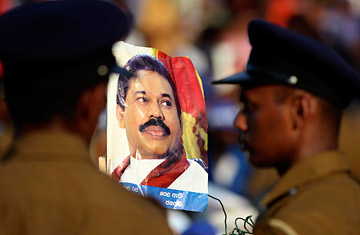
Police officers stand guard at a rally for the current President, Mahinda Rajapaksa, in Nittambuwa, Sri Lanka
Some people may celebrate Jan. 26, 2010, at Sri Lanka's first post–civil war presidential election — the island nation ended the 26-year-long conflict last May — but the advent of the poll has brought out deep tension, division and several alarming incidents of violence. "There is this foreboding sense that things could turn really bad," Keerthi Thenakoon, the chief executive of the election-monitoring body Campaign for Free and Fair Elections (CaFFE), told TIME. "It is like sitting on a dynamite pile that is giving off sparks."
The race between President Mahinda Rajapaksa and his challenger, the former army commander Sarath Fonseka, is unexpectedly close. Rajapaksa won the war against the Liberation Tigers of Tamil Eelam (LTTE), a brutal ethnic separatist group that once controlled much of northern and eastern Sri Lanka. But Fonseka, a hero in his own right in the same war, is a formidable opponent. He represents a patchwork coalition of opposition parties united in their antipathy to Rajapaksa, whom they say has disregarded the rights of the Tamil minority and indulged in blatant crony capitalism.
The opposition has even raised the specter of a military coup, warning that Rajapaksa will do anything to stay in power. At election rallies, some opposition speakers alluded to the People Power movement in the Philippines, born of outrage against the discredited 1986 election there. Rajapaksa's party dismissed those fears. "We don't need to use thuggery," says Susil Premajayantha, general secretary of the President's ruling United People's Freedom Alliance. "The people are behind us."
Independent election observers say they have no evidence of a planned coup, but they are bracing for more violence. In the past two weeks, three people have been killed in election-related violence in Kurunegala, 100 km north of Colombo, and one in the southern district of Hambantota. The dead include a 60-year-old woman, who was shot when an unidentified group opened fire on a busload of people returning from a Fonseka rally. Another Fonseka supporter was clubbed to death on Jan. 18. A bomb targeting a ruling-party politician killed one Rajapaksa supporter; another was shot when two rival groups clashed. Five days before the election, the house of Tiran Alles, a key Fonseka aide and former ally of Rajapaksa, was fire-bombed, although no one was injured.
There are measures in place to prevent election fraud. Rohana Hettiarachchi, executive director of People's Action for Free and Fair Elections, says his group has already allocated additional local and international election monitors to sensitive polling districts. Sri Lanka has a well-established, compulsory national identity-card system used to verify voter rolls, and each candidate is allowed four representatives at each counting station. Hettiarachchi has appealed to the police and armed forces to uphold the law and maintain order, no matter what the result. "It is a crucial election, and their impartiality will matter a lot," he says.
If there is violence on polling day, voters may stay home in fear, CaFFE's Thenakoon warns. That's a big risk for the opposition, as Fonseka supporters say that the higher the voter turnout, the better his chance of ousting Rajapaksa. "They want to keep us away from the booths," Fonseka told the crowd at his final election rally on Jan. 23. "We should not get scared, we should go and vote."
The elections were called early by Rajapaksa, who is seeking to validate his victory against the LTTE. Instead, many voters are taking the opportunity to send him a message that they are still suffering economically. Karu de Silva, a resident of Colombo and father of two, says he plans to vote for Fonseka because he feels that Rajapaksa's government has not given families any relief from rising prices. "This year I spent probably twice as much as I spent last year on the books for the new school year," de Silva says. "We need some kind of help."
The other important voting bloc is Sri Lanka's Tamil minority. With Rajapaksa and Fonseka expected to split the vote of the Sinhalese Buddhist majority, Tamils could become kingmakers. But election monitors have serious concerns about their access to the polls. There are about 170,000 recently resettled war refugees, and another 108,000 displaced people who are still held in camps. The Rajapaksa administration has repeatedly said they will all have a chance to vote, but only 35,000 of the displaced have been registered according to officials at People's Action for Free and Fair Elections, the country's foremost election-monitoring body. In areas that were most firmly under LTTE control, there have been no elections or voter rolls in years. "There is a chance that a lot of people could be disenfranchised simply because they are not in the list," Hettiarachchi says.
The immediate aftermath of the election is likely to be tense no matter what the outcome, and the winner will have very little time to bask in the glory. He will lead a country battered by a bloody finale to the war and a tottering economy, and a people in desperate need of reconciliation.
